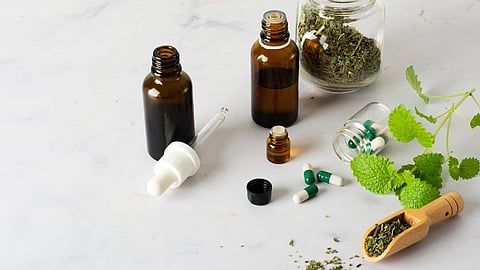OVERVIEW
Herbal medicine, with a rich historical background, is re-emerging as a valuable component of contemporary healthcare. It offers a wealth of benefits, from complementing conventional treatments to promoting preventive health. By addressing challenges and fostering ongoing research, we can harness the full potential of herbal medicine to enhance modern healthcare and well-being.
Herbal medicine is plant-based remedies known for its therapeutic nature. Used for treatment and prevention of diseases, rooted in historical practices and increasingly supported by modern research. It has been used for thousands of years across different cultures to treat various health conditions and promote overall well-being. It can come in many forms, including teas, tinctures, capsules, and topical applications. They are often used to support overall health, treat specific conditions, or complement other treatments. According to the World Health Organization (WHO), herbal medicine is relied upon by 60% of the global population, and approximately 80% of people in developing countries depend almost entirely on it for their primary healthcare needs.
KEY ASPECTS
Ancient Roots
Ancient civilizations, from the Egyptians and Greeks to the Chinese and Indians, documented the use of herbs for healing. Development of herbal systems like traditional Chinese medicine (TCM) and Ayurveda emerged, each with a unique approach to using herbs. These systems laid the foundation for the holistic health practices we see today. In recent times, herbal medicine is more organized as Traditional Chinese Medicine (TCM) in China, and Ayurveda & Unani medicine, mainly in the Indian subcontinent.
Herbal Healing (Benefits of Herbal Medicine)
Here are common herbal medicines that research has demonstrated to be safe and effective when used correctly. Always inform your healthcare providers about any herbs or supplements you use, as they need to be aware of potential interactions with other medications you are taking.
○ Chamomile (Flower)
Chamomile helps in anxiety, relaxation, heal wounds, reduce inflammation and swelling. It may be used to treat skin rash from radiation treatments and to ease vomiting from chemotherapy. It’s taken as a tea, compress, and capsules. The compress version is considered safer by the FDA.
○ Echinacea (Leaf, stalk, root)
Echinacea is used to treat or prevent colds, flu, infections, for wound healing, to make the body’s immune system stronger. Some studies indicate that echinacea is beneficial for upper respiratory infections. It’s only used for short-term use because studies have shown that long-term use can affect the body’s immune system. It’s fall in the daisy family and many people are allergic to this, that’s why consultation is a must.
○ Feverfew (Leaf)
Feverfew is used to treat fever, migraines, arthritis, headaches and menstrual cramps. Suddenly quitting the intake may become the reason that migraines come back. It should not be used with NSAID medicines, warfarin or other medicines that thin the blood. If the leaves are chewed, then mouth ulcer and stomach upset are its side effects.
○ Ginseng (Root)
Ginseng is used to boost energy, sex drive, immune support, stress reduction and balance the body. Side effects can include high blood pressure and fast heart rate. Don’t take it with warfarin, heparin, NSAID medicines, estrogens, corticosteroids, or digoxin. People with diabetes should not use ginseng.
○ Ginkgo (Leaf)
Ginkgo is used for asthma, bronchitis, fatigue, tinnitus, for many aging related issues, to improve memory and to help prevent dementia. Ginkgo may increase the risk of bleeding. Do not use it with NSAID medicines, other medicines that thin the blood, anticonvulsant medicines, or tricyclic antidepressants. Ginkgo seeds have ginkgo toxin, which can cause seizures. In large amounts, it can lead to death.
Note: Seek professional advice before starting herbal remedies, especially if you have existing health conditions or take other medications, to ensure safety and avoid adverse interactions.


